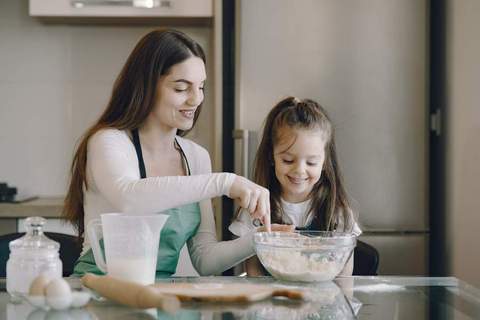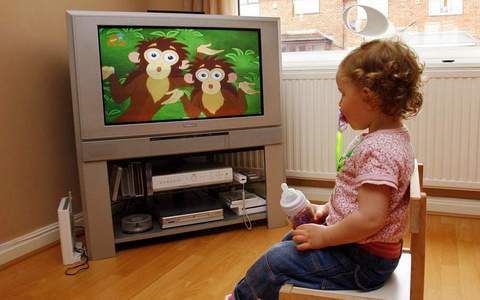By Samira Sood
“My one-year-old grandson is scared of me because he didn’t see me for six months.” “How can I finish first grade without seeing my teacher even one time?” “I don’t want to give my parents Covid.” “Will I ever see my friends again?”
These are just some of the things people told us when we spoke to them about how the coronavirus pandemic has impacted the children in their families.
In all the conversation around health in the last 10 months, an aspect that perhaps hasn’t been spoken about as much is the mental health of children – more specifically, how Covid has affected it. We spoke to parents, paediatricians and psychologists to understand more.
Aggression, fear, depression, delayed milestones
Among different age groups, the impact of the pandemic shows up differently. “Aggression in younger children, depression in older ones,” says Dr Arun Wadhwa. The Delhi-based pediatrician tells Slurrp Farm he has referred more children to psychologists in the last 10 months than ever in his 30-year career.
Teenagers who are already dealing with hormonal changes, and are very attached to their friends, are withdrawing into themselves, “even more than they already do,” explains Ann Philipose, a couples and family therapist based in Delhi.
On the other hand, kids from the age of five upwards are getting more clingy, they’re hitting parents, bullying siblings – because with no outdoor activity, no school, no park time, no going downstairs to play, they’re just not getting an avenue to expend their pent-up energy, and they want attention from their parents, who are often themselves dealing with anxiety and their own fears about Covid. And kids can sense that fear.
5 Engaging Kid’s Activities During Coronavirus Quarantine
“My daughter, who’s six, had been happily sleeping in her own room since she was nine months old, but somewhere during the pandemic, she began to sleep poorly and kept wanting to come back to our room,” says Delhi-based Nayantara Sood. Kids that age don’t understand everything fully, but they hear what their teachers and parents say about lockdown, about hygiene, about friends and relatives falling sick. “When we watch the news, they also get a sense of how bad the situation is, how many people are falling ill around the world. They don’t fully grasp the idea of death, but they are suddenly forced to confront it because they hear about it more.”
And infants and toddlers? They’re scared of new people, including their own family, because they have spent most of their life only with parents and siblings. Mira Deshpande from Pune recalls how her daughter and son-in-law went across for a visit on Diwali. “It was the first time since March that my year-old grandson was seeing me, and he was so scared, he couldn’t stop crying. I wanted to hold him but he was so distressed. It broke my heart that I was a stranger to him.”
Even milestones such as talking and toilet-training are getting delayed, explains Ann Philipose, because kids who would otherwise be going on play dates and going to the park have been cooped up at home, and the lack of socialization is affecting their development.
Weight gain, screen time, and the problem of education
The idea that children will get over this setback is fair to some extent, but it doesn’t take into account the way the lockdown and staying home has also impacted their physical health. Dr Wadhwa explains that unprecedented weight gain is something he and many of his colleagues have witnessed among almost all their patients. “Normally in 9-10 months, a child should gain 1.5 to 2 kilos, but every child has gained 5 kilos on average, sometimes even up to 10 kilos. Kids aren’t going anywhere, they’re at home, they’re spending more and more time in front of a screen, many are anxious or depressed, and they’re snacking. Parents are tired of cooking – especially during the early lockdown months when most didn’t have household staff coming in, and with both parents working, and the line between work and home vanishing, it has been hard to maintain a disciplined diet.”
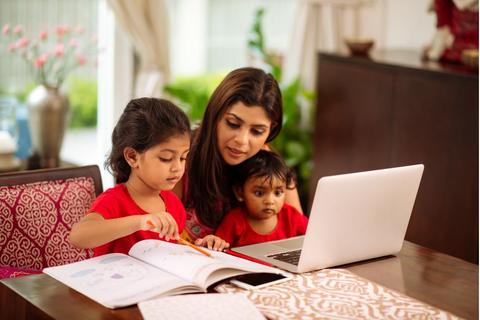
And for girls, he says, excess weight gain can lead to hormonal problems as well, like PCOS (polycystic ovary syndrome). Post Covid, he predicts, we’re going to have a deluge of young people with hypertension, obesity, PCOS and more.
Another impact of the Covid pandemic is that children are even complaining of neck and back pain, a result of spending more time than ever in front of a screen. This is not only causing physical problems like poor eyesight, headaches, and posture issues, but also making kids less socially adept – they’re withdrawing further into their games and shows and not talking, not opening up.
Keep to a routine, but be flexible
An important question, then, is about the role of the parents in their kids’ mental health. The fact is that the pandemic has also brought to the fore the anxieties of parents, be it how much screen time they allow their children outside of classes, guilt for not being able to take them on holidays or to birthday parties, or even just sharing in their child’s sadness about not having a proper high-school graduation party. And many parents, says Ann Philipose, are worried they are not being good enough parents.
But what can be done?
“We strongly recommend some physical activity for kids – a bicycle ride, go up to the terrace or lawn if there is one, go to the park,” says Dr Wadhwa, “and basic dietary rules – avoid soft drinks, cheese, chocolate, and other junk food, control portion sizes. Also, don’t allow eating in front of a screen – when you’re focused on something on the screen, you’ll tend to eat more.”
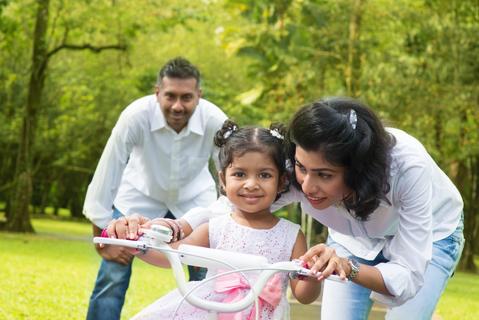
He strongly advocates a routine. “All parents are complaining that children, especially older ones, have lost their routine,” recounts Dr Wadhwa. “If school starts at 9, they get up at 8:30, quickly brush their teeth and sit in front of the computer, put off the video and eat breakfast while online. It’s completely affected their metabolism too – they’re not doing their morning potty. A structure to the day is important.”
5 Steps To Screen-Free Mealtime
At the same time, Ann Philipose adds, don’t overcommit and don’t stretch yourself or the kids. “Before giving your child a task, take a moment to reflect on your own bandwidth, and then reduce the task to a bit under that. And then reduce further for your child – if the pandemic is hard for you, it’s even harder for children, so it’s okay to take it easy sometimes. Decide the non negotiables – eating, sleeping, physical exercise – and then leave some space. You don’t have to fill up all your child’s hours just to assuage your parenting guilt – you can be a great parent even if your child isn’t doing 20 tasks a day.”
Parenting in a pandemic – the silver lining
The pandemic has led to some positive changes in children as well – there is a growing awareness of what the world is, how small and how connected it is, and how one’s actions, like not wearing a mask, affect others. Sood recalls how her daughter and a friend’s kids put together a play for their parents on how they defeated the coronavirus, which was portrayed as a “poopoo monster.”
Apart from the relief of seeing the kids’ humour still intact, it was nice to see how they worked hard to get the scientific concepts right, to talk about hand hygiene and mask-wearing. Sood adds that her father would conduct Zoom lessons for his granddaughter during the lockdown on any topic of her choice, and how she would invariably choose topics like how vaccines work, what vitamins are in what fruit and vegetables, how the immune system functions.
Paritosh Shah has had a similar experience on that front. The Mumbai-based father of an eight-year-old boys says he doesn’t have to remind his son to wash his hands before a meal – he’s already done it, and probably a few times over. The child is also pretty intuitive – he knows his grandfather is in the high-risk category, so even when they do meet now, he wears a mask without being told, and he even asks before giving him a hug. “It’s heartbreaking to hear a child ask that, but it also shows he’s picking up cues from what he sees and hears, he’s being sensitive to other people, and that’s good to see.”
Both he and Sood agree that the one major silver lining, if one can call it that, of the pandemic has been the amount of time they have got to spend with their kids. Sood says that to actually see her daughter interact with her teachers and classmates has been very special and interesting, and shown different sides of her personality that were otherwise just after-school stories.
For Shah, as for so many fathers, in fact, the pandemic has overturned gender roles and made fathers the primary carers as much as motherhood a different effect The idea of being a stay-at-home dad has long been scoffed at by traditionalists, but Covid has put paid to any such notion, with both parents at home. Parenting and household chores are now divided equally, says Delhi-based Varun Sahni, which, “despite our best efforts, was not the case earlier.” The last time he spent this much time with his six-year-old son was when the child was less than a year old. “We go down for a bit of play time, we’ve done some easy cooking projects, we watch movies and we’ve started to play Monopoly, Junior Catan, and a couple of other board games. And now he asks for me to tuck him in sometimes,” he says proudly.
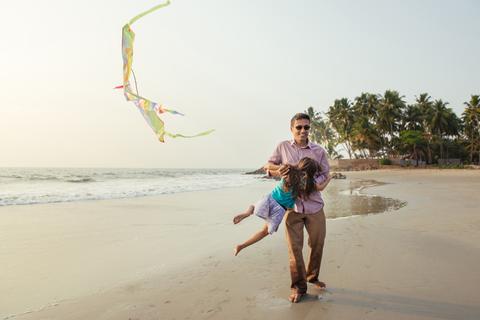
Modern Dads Take Charge Of Their Child’s Nutrition By Eating Right
While this particular impact of the pandemic is fun for Sahni and helpful for his wife who works from home, he adds that it’s also good for his son to see him at home. “He’s at that age where he’s absorbing the idea of gender roles, so I’m glad that the pandemic forced me to break out of old habits and actually be around the house more. When he sees me in the kitchen or doing the laundry, it shows him that it’s everyone’s job, not just his mother’s – and I hope that stays.”

